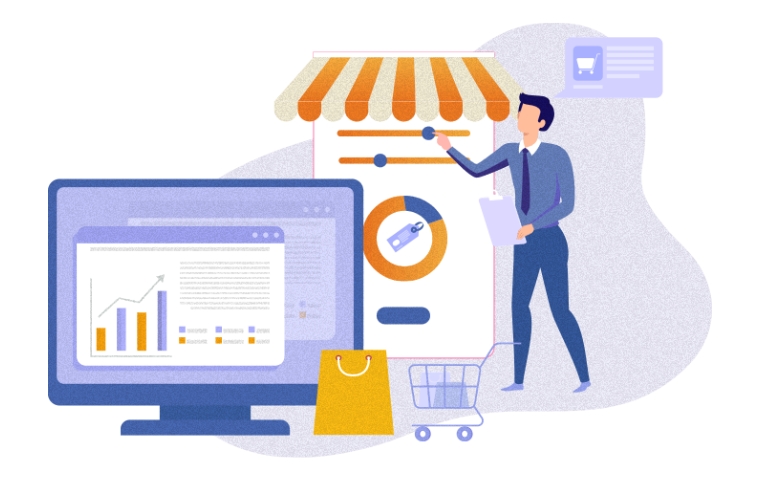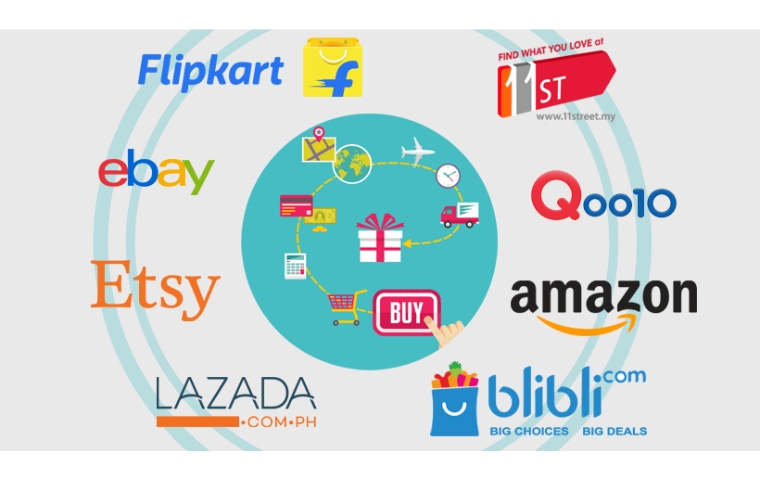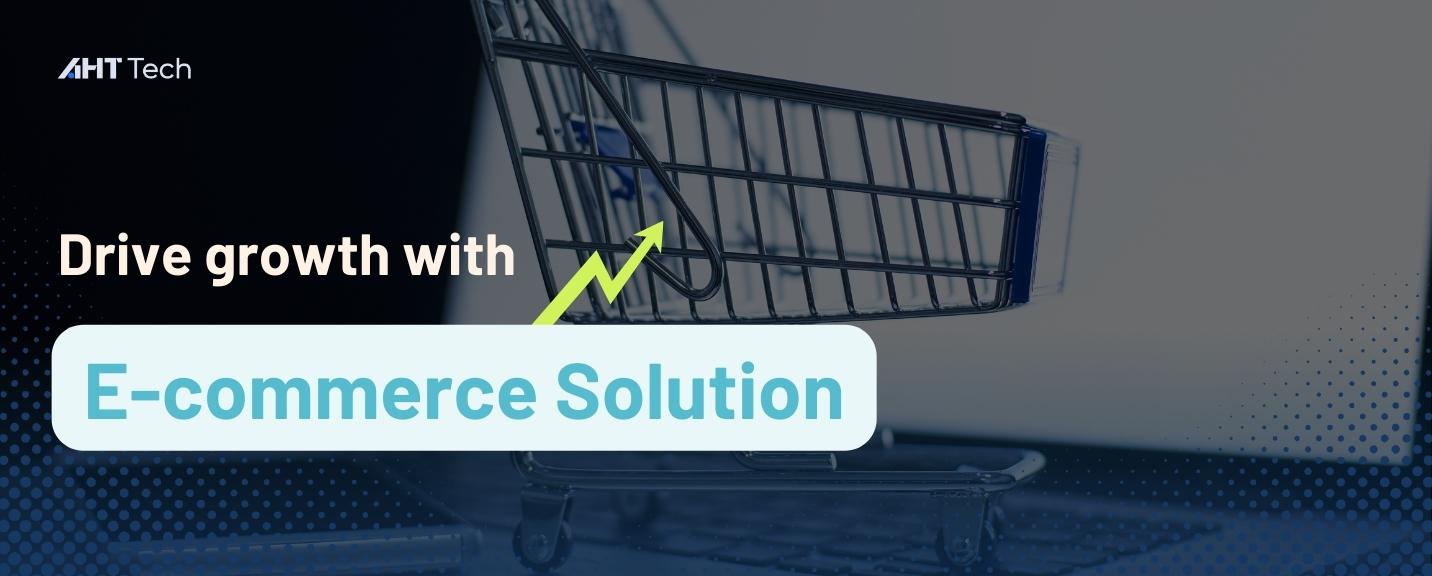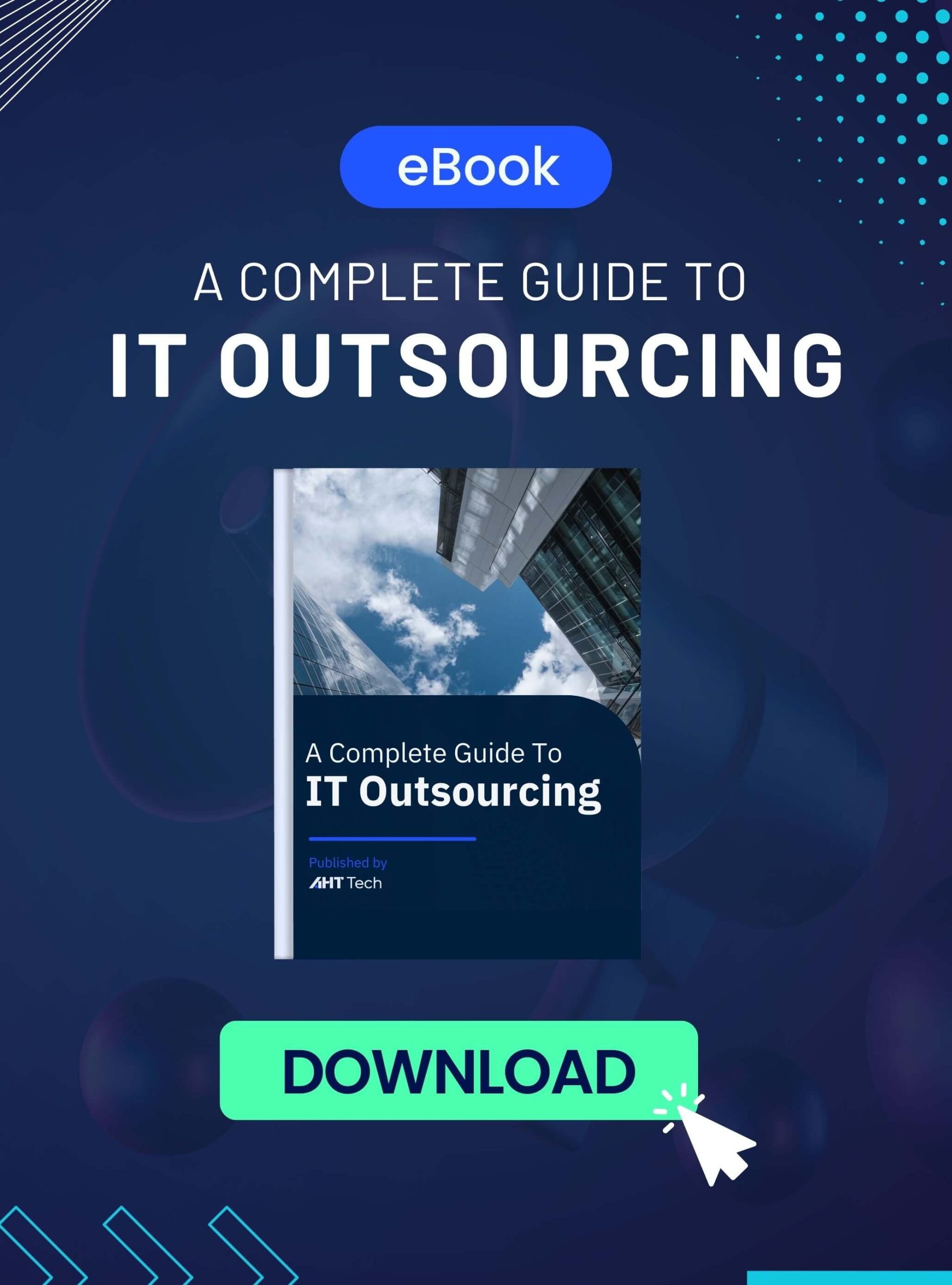TABLE OF CONTENT
What is an E-commerce Solution?
Highlighted E-commerce Solution Features
Things to Consider When Choosing Your E-commerce Solution
Conclusion
What is an E-commerce Solution?
E-commerce solutions can be concisely defined as a collection of software, technologies, and functions built to enhance the purchasing experience and boost sales. This solution can be implemented in a variety of forms, including websites, payment processing systems, and delivery management. In addition, businesses can customize the interface, layout, and order fulfillment capabilities. By selling their services and products online, firms can expand their customer base globally and increase their profits.

E-commerce vs E-commerce Solutions?
E-commerce and e-commerce solutions are two related but distinct terms. Although E-commerce is easily defined as the act of buying and selling products over the Internet, its technical aspects and personalized features are left out of the definition. In contrast, e-commerce solution refers to eCommerce development, the technology, and the tools to facilitate this process.
The definition of E-commerce includes a wide range of activities such as product listing, order processing, payment processing, and customer-driven services. Besides, E-commerce can be deployed through many different forms, such as company website, global platform like Amazon or eBay to help reach millions of users. Social media platforms and mobile apps are indispensable – where people can become potential customers anywhere and at any time of the day due to easy accessibility.
Meanwhile, E-commerce Solution will mainly focus on technical aspect, which are platforms, software, or features that businesses utilize to manage their online store and sell products or services online. To implement an effective E-commerce solution, enterprises need to pay attention to factors such as interactive website design, shopping cart, payment gateway integration, inventory management, and order processing. This entire process needs to deliver a streamlined experience for buyers to increase orders successfully.
Many people will assume that E-commerce and E-commerce Solutions are the same. Indeed, they are indeed related in a number of ways, but when you analyze them in detail, you’ll see that these are two separate concepts. E-commerce is simply the buying journey on online stores and platforms. On the other hand, E-commerce solutions will involve development activities to improve the shopping experience, while integrating more features to support effective sales. Order management, shipping, customer payment systems, etc., are constantly in need of innovation in order to keep up with the rivals.
Highlighted E-commerce Solution Features
Hosting environment
The hosting environment should have fast loading times, minimal downtime, and the ability to handle high traffic volumes. A slow website can negatively impact the user experience and lead to lost sales. Rest can be particularly costly, resulting in missed opportunities for sales and damage to the website’s reputation. An e-commerce solution should be hosted on a secure server protected from cyber threats and data breaches.
Unlimited API call volumes
By using APIs at the inception of E-commerce platforms, businesses can connect with third-party apps and services to boost productivity. To facilitate the integration of those elements in order to enhance the shopping experience, an E-commerce solution will give endless API call volumes. APIs enable efficient operations and the automation of intricate tasks like order processing and shipment. By providing order and shipment status updates in real-time, a powerful API system can further boost customer satisfaction.
User-friendly website builder
A user-friendly e-commerce website builder is essential for businesses that need more technical expertise. Creating your own website has never been easier due to the development of DIY website-building platforms that enable businesses to create websites from scratch using simple features and an incredibly intuitive drag-and-drop interface. These platforms are entirely fit for infancy programming knowledge.
Website builders normally include customizable templates and themes, mobile-responsive interfaces, and the function to add product descriptions, images, and pricing information. Furthermore, an ideal platform should include inventory management, order processing, and report generation features.
Security
The platform must protect customers’ personal and financial information. The platform should have SSL encryption, two-factor authentication, and PCI compliance. SSL encryption ensures data is transmitted securely between the website and the user’s browser. PCI compliance is a set of standards established by the payment card industry to ensure that businesses handling payment card information follow strict security protocols.
Compete with search engine optimization (SEO)
The eCommerce platform should have built-in SEO tools like meta tags and descriptions, schema markup, and URL structure optimization. These tools can help improve the website’s visibility in search engine results pages (SERPs) and drive more organic traffic. Additionally, the platform should provide mechanisms for tracking website analytics, such as traffic sources, page views, and conversion rates. These metrics can help businesses identify areas for improvement and optimize their marketing strategies accordingly.

Things to Consider When Choosing Your E-commerce Solution
Reasonable Budget
Budget is also a decisive factor in choosing the right E-commerce solution for your business. Depending on your needs and business model, you need to make choices for setup fees, monthly fees, transaction fees, and additional costs during the operation and maintenance of the sales website. Learn to make informed decisions which are beneficial for your business desires.
Web design
Your website’s design is crucial for establishing a solid brand identity and attracting customers. Choose a platform that offers a wide range of customizable templates that align with your brand’s aesthetic. Ensure that the templates are mobile-responsive, as more and more people are shopping online using their mobile devices.
Programming and functionality
For essential and advanced functionalities (based on the business’s specific needs), the platform must provide the required features. Examples include shopping cart storage, secure payment gateways, and inventory management. If needed, ensure the platform can handle complex product configurations, customer segmentation, and pricing rules. Consider if you need advanced features like multi-currency support or international tax calculation.
Security
Information about customers’ personal data is something that businesses do not want to risk with it to ensure credibility, so the security factor is always a top concern for E-commerce businesses. As competition gets fiercer, make sure the platform you choose can offer robust & security features to protect shoppers. Look for a platform with SSL encryption, fraud detection, and two-factor authentication. Ensure that the platform is PCI compliant and follows industry-standard security protocols.
Monthly hosting
Some e-commerce solutions include hosting as part of their service, while others require businesses to find a separate hosting provider. Consider the cost and reliability of hosting when selecting an eCommerce solution. Choose a hosting provider that can handle high traffic volumes and offers fast loading times.
Maintenance
Maintenance is an ongoing task for any e-commerce website, and ensuring that the platform offers reliable technical support is essential. It’s up to you to decide which platform has the expertise and resources needed to keep your website up-to-date and functioning properly. Ensure the platform offers reliable technical support through phone, email, and live chat channels.
Integration with business software
Choose a platform that integrates with your existing business software, such as CRM or accounting. Utilizing an E-commerce solution can partly save your time and get rid of faults with the help of automating processes and syncing data across multiple platforms.
Flexible Customization
Select a platform that easily customizes your online store’s design and functionality. This can include adding custom code or integrating with third-party applications.
Sales and advertising channel compatibility
Businesses should look for a platform that can support multiple shopping channels, such as Amazon or eBay, and don’t forget to take advantage of other popular forms of advertising like Google Ads or Facebook Ads. This can help expand your customer reach and increase sales. This can help expand your customer reach and increase sales.
Product inventory complexity
Consider the complexity of your product inventory and ensure the platform can handle it efficiently. Some venues may limit the number of products or variations that can be listed.
Scalability
Select a forum that can accommodate your business’s growth and is scalable to handle increasing traffic and sales volumes. Look for a platform that offers the flexibility to upgrade to higher-tier plans or add additional features as your business expands.
Customer service
During the shopping process, it will inevitably arise problems such as system errors, technical errors, etc., so businesses need to ensure that the E-commerce platform they use can support customers in time to reduce the rate of being underestimated.Look for a platform that provides phone, email, and live chat support and has a robust knowledge base or community forum to assist with troubleshooting.
Conclusion
An e-commerce solution is an excellent way for businesses to establish an online presence and drive growth. When selecting an e-commerce solution, take into account the platform’s cost and technical support, as well as the features and functionality that are in line with your business’s needs and objectives. Businesses can improve online visibility, increase revenue, and reach a wider audience by choosing the right e-commerce solution. Contact us today to choose the best-fit e-commerce solution for your business!



